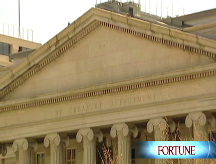Meredith Whitney to banks: Deal with it
The influential analyst says taking toxic mortgages off banks' books only begins to address their fundamental problems.
 |
| Oppenheimer analyst Meredith Whitney argues that banks will remain weak, even if a "bad bank" makes their books look healthier. |
NEW YORK (Fortune) -- Banks are looking for a second chance to dump some toxic waste from their balance sheets on the hope that the Obama administration will set up a "bad bank" to buy massive amounts of their troubled assets.
The end goal is to get banks lending again, but Oppenheimer bank analyst Meredith Whitney doesn't think that separating the bad from the ugly will get money flowing. Instead, she says banks should bite the bullet and start selling their good assets.
In an interview with Fortune Friday, Whitney argued that a "bad bank" does not attack the fundamental problems eating away at these firms.
"The bad bank is a covert way to recapitalize banks by paying more for the assets than the market would, she said. "Then the banks might be able to write up the value of the securities. This would give them, on paper, more tangible equity. In theory they would look stronger."
But Whitney believes the banks will remain weak, even if their books look healthier, because they have to deal with a lot more than just bad assets: As consumer and business spending slows, banks will still incur losses on their "good" loans; they would be forced to set aside more cash, which would cut into earnings; and there's also the simple fact that a recession means less demand for their business.
Banks created and held onto billions of dollars in esoteric credit products that were made up of everything from subprime residential mortgages to credit card payments. These securities have sunk in value as default rates on the underlying assets rise.
As the credit crunch gathered steam, banks hoarded cash, including the money they received from the Treasury's $700 billion Troubled Asset Relief Program. This program was originally conceived to buy their toxic assets, but was used instead to inject money directly into the banks.
The original TARP plan was rejected in part because of worries about asset pricing. If Uncle Sam paid too little, the banks would crater anyway - pay too much and taxpayers would eat the losses. The "bad bank" proposal faces the same essential pricing problem.
Whitney says it would be better to force big institutions like Citibank (C, Fortune 500) and Bank of America (BAC, Fortune 500) to sell the marquee pieces of the business that they can, fill the hole, and shrink.
"That's what people like you and me, what taxpayers have to do when we are in financial distress. We have to sell whatever it is we can, which is almost always our best assets, and deal with it. We can't just sell what we want to, which would of course be our bad stuff."
It's a punitive measure that banks are trying to avoid, and they argue that there are no buyers out there for even the good, stable pieces of their businesses. But Whitney disagrees.
"There is always a buyer at the right price, be it private equity or a rival business or another bank," she says. "If the government provides a facility through which people can get long-term funding, then buyers will come to the market for the 'crown jewels' assets of these banks." ![]()
-
 The retail giant tops the Fortune 500 for the second year in a row. Who else made the list? More
The retail giant tops the Fortune 500 for the second year in a row. Who else made the list? More -
 This group of companies is all about social networking to connect with their customers. More
This group of companies is all about social networking to connect with their customers. More -
 The fight over the cholesterol medication is keeping a generic version from hitting the market. More
The fight over the cholesterol medication is keeping a generic version from hitting the market. More -
 Bin Laden may be dead, but the terrorist group he led doesn't need his money. More
Bin Laden may be dead, but the terrorist group he led doesn't need his money. More -
 U.S. real estate might be a mess, but in other parts of the world, home prices are jumping. More
U.S. real estate might be a mess, but in other parts of the world, home prices are jumping. More -
 Libya's output is a fraction of global production, but it's crucial to the nation's economy. More
Libya's output is a fraction of global production, but it's crucial to the nation's economy. More -
 Once rates start to rise, things could get ugly fast for our neighbors to the north. More
Once rates start to rise, things could get ugly fast for our neighbors to the north. More








